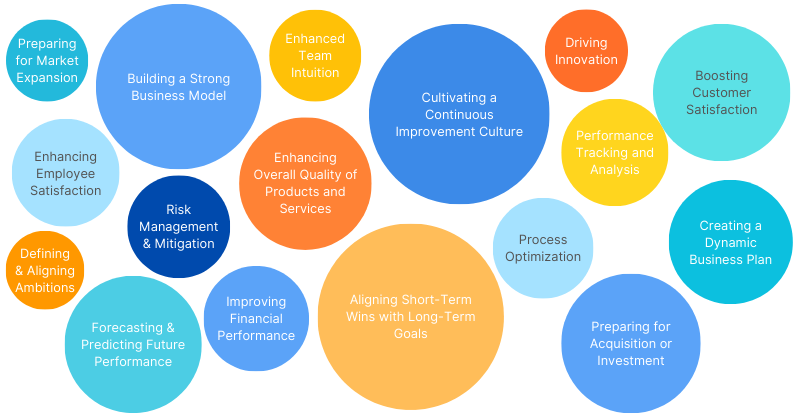
What is quality management?
Master Your Purpose. Own Your Freedom. With ICR.
Quality management revolves around ensuring a predefined quality level of a product, production process, service, or organization. Within ICR, quality management is explicitly included as an objective because it is integral to all processes and components of your organization.
Quality management is a systematic approach within your organization to ensure that the products or services provided consistently meet certain quality standards. This process involves planning, controlling, assuring, and improving the quality of products, services, and processes within an organization.
The ICR in the growth compass serves as the overall indicator of the quality level of your organization.
Below are some key components of quality management:
- quality planning involves setting quality objectives and specifying the necessary operational processes and resources to achieve these objectives.
- quality assurance includes all activities to ensure that products or services meet the established quality standards. This often involves audits and reviews.
- quality control is the process of monitoring and measuring products and processes against the established quality standards to ensure they meet the requirements.
- quality improvement involves systematically improving processes and products based on the feedback and results from quality controls.
An effective quality management system ensures that products and services meet or even exceed customer expectations. This leads to higher customer satisfaction and loyalty. By optimizing processes and minimizing waste, quality management increases efficiency and saves costs. Fewer defects and errors result in less rework and lower consumption of raw materials.
Organizations that consistently deliver high quality stand out from their competitors. This leads to a better reputation and a stronger market position. Additionally, many industries have strict regulations and standards they must comply with. A good quality management system helps organizations meet these legal requirements, reducing the risk of legal issues and fines.
Working in a well-organized environment with clear quality standards and processes contributes to a higher level of employee satisfaction. It fosters a culture of continuous improvement and engagement. Through continuous improvements and a focus on quality, organizations encourage innovation and can tap into new market segments. Quality management ensures that new products and services can be brought to market faster and with less risk.
Therefore, quality management is indispensable for the success of organizations. It not only ensures satisfied customers and a strong market position but also contributes to operational efficiency, compliance with laws and regulations, and a positive work environment. By implementing and maintaining a good quality management system, organizations achieve sustainable growth and success.
Sustainable success through controlled and manageable growth
The ICR Growth & Success SaaS Platform helps people and organizations find balance and peace, through controlled and manageable growth, with the aim of a healthy and sustainably successful organization. We do this through the all-encompassing ICR Cycle.
Being inControl in this process from ambition to result is crucial. Within the ICR Cycle, inControl actually means controlled and manageable growth. The dashboard gives you insight into the current status. In the video below you can see how the dashboard transforms from the moment you start using ICR.
With our 4 ICR subscription options, you can decide for yourself when to fully engage with the entire ICR Cycle. Choose our successful approach and start your process 'from ambition to result' with the more than affordable ICR Ambition Refresher subscription.
General applications of the ICR Growth & Success SaaS Platform
The ICR Growth & Success SaaS Platform addresses a wide range of business needs, making it a versatile tool for organizations striving for sustainable success. Below is an overview of its general applications, along with the added value it provides for businesses and organizations.
Learn more about the general applications of the ICR Growth & Success SaaS platform.


